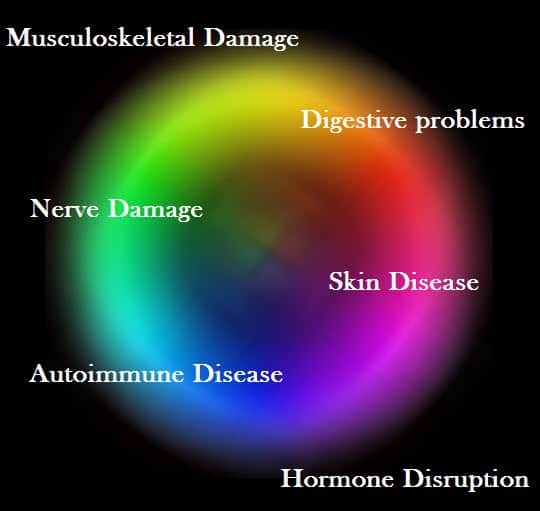new to the gluten free journey?
new to the gluten free journey?
All truth passes through three stages. First, it is ridiculed. Second, it is violently opposed. Third, it is accepted as being self-evident.Currently we are in the first two stages. Ignore the naysayers. Remember that most medical doctors don’t even study nutrition. That being said, how can they be qualified to comment on a spectrum who’s origin is nutritional? The time of ignoring the power of food as a contributing cause in health and disease is coming to an end. The time of doctors calling their patients crazy because the flawed lab test they are using comes back normal is at an end.
 The following is an abstract from a recent paper published in the journal, Rev Neurol. 2011 Sep 1;53(5):287-300.
The following is an abstract from a recent paper published in the journal, Rev Neurol. 2011 Sep 1;53(5):287-300.
Gluten sensitivity is a systemic autoimmune disease that occurs in genetically susceptible individuals on ingesting gluten. It can appear at any age, then becoming a permanent condition. It is more frequent in women, as happens with other autoimmune diseases. Celiac disease is the intestinal form and the most important manifestation among a set of gluten-induced autoimmune pathologies that affect different systems. Neurological manifestations of gluten sensitivity, with or without enteropathy, are also frequent, their pathogenesis including an immunological attack on the central and peripheral nervous tissue accompanied by neurodegenerative changes. The clinical manifestations are varied, but the most common syndromes are cerebellar ataxia and peripheral neuropathy. Finally, gluten sensitivity is associated to a varying degree, with other complex diseases and could influence their evolution. The early detection of cases of gluten sensitivity with neurological manifestations and subsequent treatment with the gluten-free diet could provide remarkable benefits to the patients.
 This research study is just another study of an ever growing list of medical research documenting the existence of gluten sensitivity in the absence of celiac disease. Why is this important? Most doctors don’t know the difference. Most doctors aren’t aware that gluten can contribute to hundreds of symptoms, syndromes, and diseases. Many of these symptoms manifest not in the gut, but in other tissues and organs. If you know a doctor who needs educating, please inform them that Gluten Free Society now offers an online certification program. This course is a 2 part, 10 hour class on what they need to know. Don’t let a doctor tell you that you are crazy or that the disease is all in your head. Below is a list of some of the common ways gluten can affect you.
This research study is just another study of an ever growing list of medical research documenting the existence of gluten sensitivity in the absence of celiac disease. Why is this important? Most doctors don’t know the difference. Most doctors aren’t aware that gluten can contribute to hundreds of symptoms, syndromes, and diseases. Many of these symptoms manifest not in the gut, but in other tissues and organs. If you know a doctor who needs educating, please inform them that Gluten Free Society now offers an online certification program. This course is a 2 part, 10 hour class on what they need to know. Don’t let a doctor tell you that you are crazy or that the disease is all in your head. Below is a list of some of the common ways gluten can affect you.
Stay up-to-date with the latest articles, tips, recipes and more.

*These statements have not been evaluated by the Food and Drug Administration. This product is not intended to diagnose, treat, cure or prevent any disease.
If you are pregnant, nursing, taking medication, or have a medical condition, consult your physician before using this product.
The entire contents of this website are based upon the opinions of Peter Osborne, unless otherwise noted. Individual articles are based upon the opinions of the respective author, who retains copyright as marked. The information on this website is not intended to replace a one-on-one relationship with a qualified health care professional and is not intended as medical advice. It is intended as a sharing of knowledge and information from the research and experience of Peter Osborne and his community. Peter Osborne encourages you to make your own health care decisions based upon your research and in partnership with a qualified health care professional.
4 Responses
I’m thankful to God for leading me to a clinic that included the genetic test that answered my current health issue questions and more than I’d known to ask. Finding out that I’m gluten intolerant and knowing that one change in eating preference can prevent up to 200 or more health conditions is a miracle of truth from God. Now I look back on all the many differing conditions that members of my family have suffered through, including my own children and grandchildren. Guess what? EVERY SINGLE CONDITION is on the list of conditions/symptoms linked to gluten intolerance or sensitivity. I don’t want my family to needlessly suffer, so I speak and share info as often as I can…… My own son, upon speaking with his fiance’s mother and hearing from her that she and her son have celiac disease, replied to her, “So, my mom isn’t crazy then?!!” No. I’m not crazy 🙂 I’m enlightened by truth. That’s what I asked God for: Answers to my suffering; Truth. And no bandaids. With truth, comes enlightenment and freedom to choose. I pray we who hear the truth choose well for ourselves and those we love. Praise to our Lord for all of you at Gluten Society who research, document and share revealing and healing info with us who desire to be well. Thank you!!!
Thank you Patti! So glad you found help!
All the best,
Dr. O
Perhaps it could be because most, if not all medical doctors are unaware that grain is being bred with ever increasing levels of gluten. New varieties of wheat are needed every seven years or so to stay ahead of the diseases that affect it. Since the 1940’s the levels of gluten in wheat have increased by at least 500%, and we as simple humans are becoming less and less able to deal with these increasingly high levels.
In addition the techniques used for milling and maturing flour have also totally changed and flour is not allowed to oxidize which it was traditonally meaning that some of the most damaging protiens were broken down.If all that is not bad enough, you then have the development of GMO grains full of DNA from a wide array of unrelated plants and animals. If you think the problem is bad now it will only become worse in the years to come. The only thing that amazes me is thatit seems that so few doctors are actually sufferers, why is this?
Its all so simple…if it hurts to eat it,then you dont eat it!!
It doesnt matter what label it is given. BUT I thank God that theres still food that I CAN eat!!!!